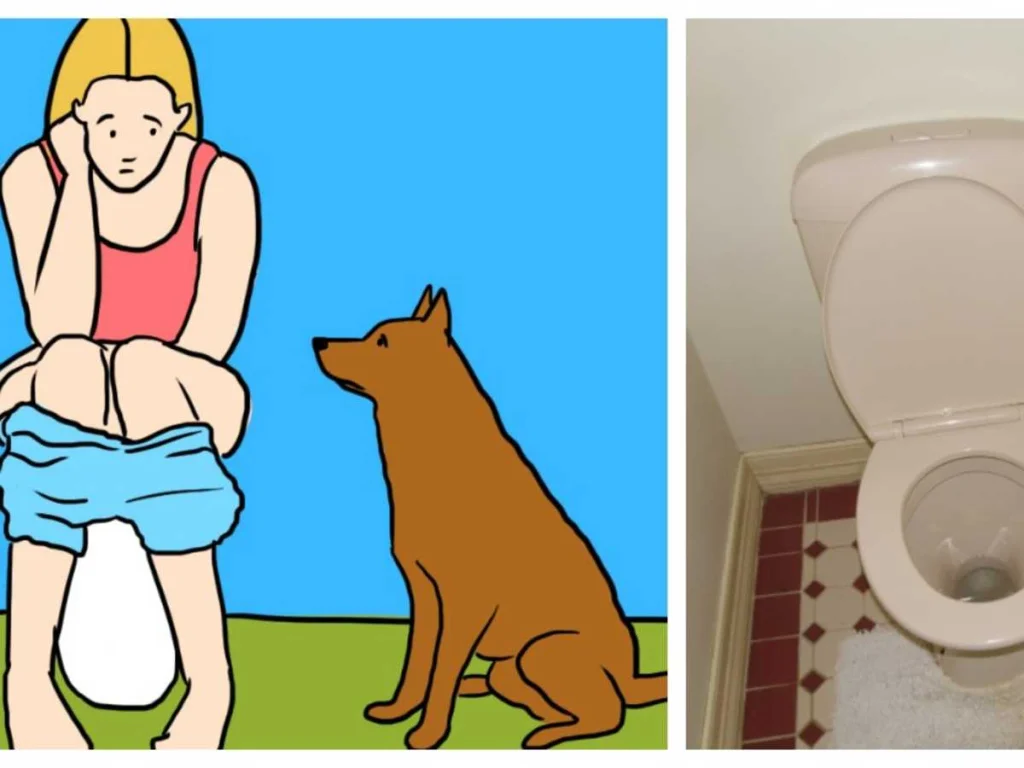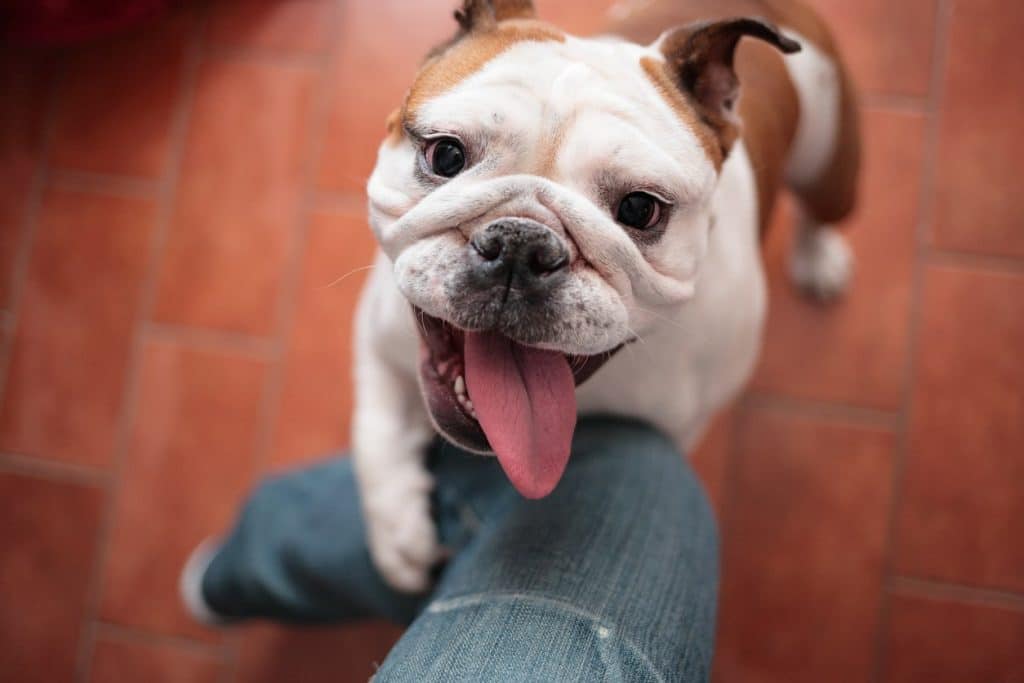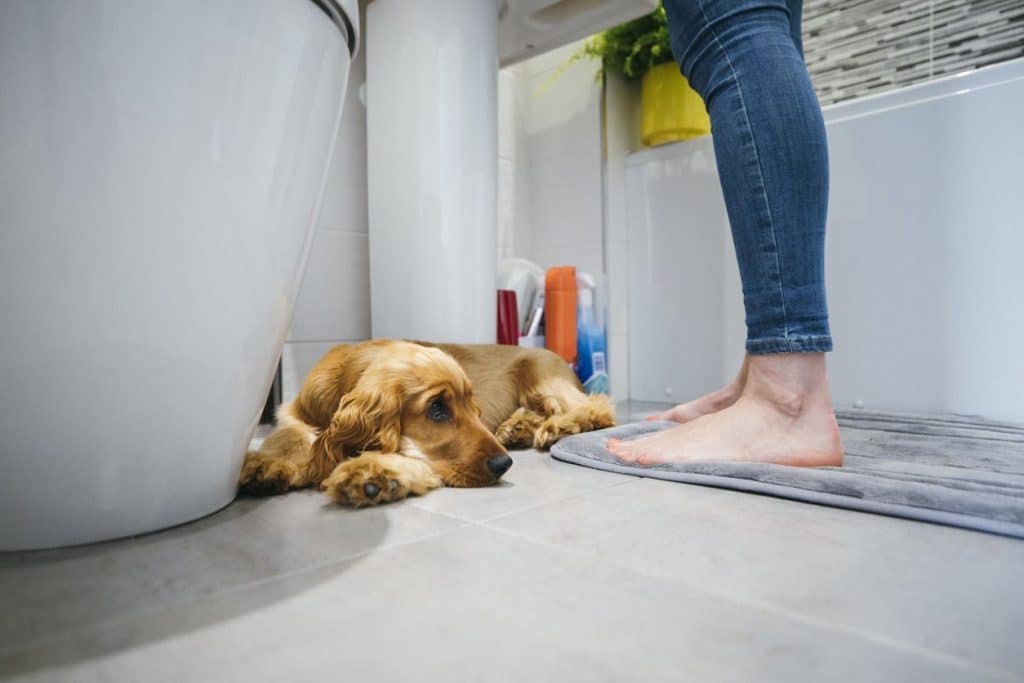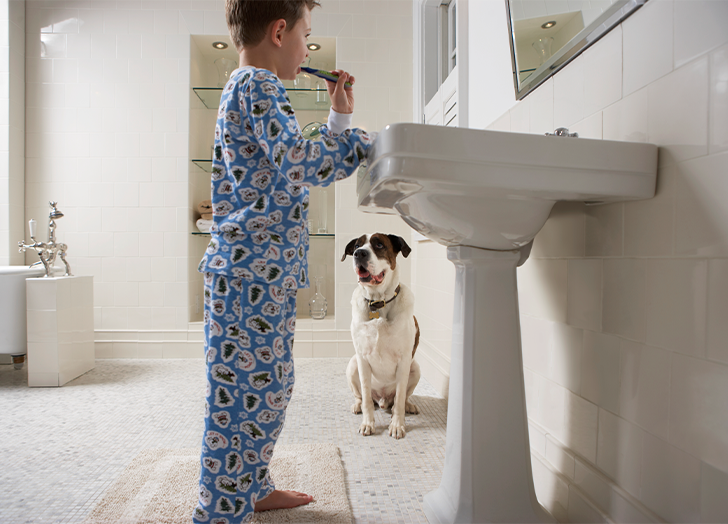Why Does My Dog Follow Me Into the Bathroom? | 8 Reasons

8 Reasons Your Dog Loves Following You Everywhere
There are several reasons Why Does My Dog Follow Me Into the Bathroom? us everywhere, ranging from enjoying the strong bond you share to seeking stimulation or comfort through a stressful event. Dogs are very social animals, There’s a Really Cute Reason Why Dogs Follow You to The Bathroom so being close to their preferred people makes sense. Your dog’s preference to be with you is likely instinctual, especially if you raised your dog from their puppy years.
Most commonly, dogs want to be around you because they are curious, says Meaghan Thomas, DVM, an East Ridge Animal Hospital veterinarian. Then there are velcro dogs, who prefer to stick close to “their person” in every scenario. However, Why Do Dogs Follow You Into the Bathroom? Is This Normal? she adds that this velcro behavior when paired with certain symptoms, can signal underlying stress or anxiety. Is that the case for you?
Below, we explore the main reasons your dog’s unwavering loyalty exists, and whether the behavior is encouraged or slowly addressed.

1. They Are Bonded to You
Dogs are known for forming strong bonds with their human caregivers. If your dog sees you as their favorite person, they will naturally want to be by your side as much as possible. This behavior is a testament to their deep emotional connection and attachment toward you. Got your dog younger than 8 weeks? There is a high chance your dog has “imprinted” on you.
Tip: If you reward their desire to be around you with additional pets or treats, this will only strengthen their bond with Why Does My Dog Follow Me Into the Bathroom?
2. They Want Your Attention
Dogs are social creatures that thrive on interaction and mental stimulation. Dr. Thomas says if your dog is bored or lacking entertainment, they may follow you, hoping to find something interesting to do or engage with.
Tip: For young puppies, you may want to give into those begging eyes before other behaviors escalate. Often when younger dogs are left to their own devices, you’ll see them escalate towards chewing, digging, or barking. And once it starts, the barking can be very hard to stop.
3. They Like Being in Social Environments
Dogs are social animals by nature. They may follow you around because the excitement is going to happen—or they simply don’t want to be alone or miss out. More curious and confident dogs may also like to follow you everywhere because of the opportunities to experience new things.
In this instance, you may find it fun to train your dog to do tasks while they follow you around the house.
Also for every dog who fixates on only one person to follow, there is another dog who fixates on the newest person in the house to velcro themselves to.

4. You Trained Them to Follow You
Dr. Thomas also explains that pet parents can accidentally reinforce the velcro behavior. “If you talk to your dog as he or she follows you, give them treats as you walk by the kitchen with them, etc., you are actually enforcing this behavior to be normal,” she says.
Your dog may not even realize they are following you “everywhere” because they are just following a routine you’ve built. If you want to calm your furry shadow down, try rewarding your dog with a treat for staying put, rather than following you.Why does my pet follow me to the bathroom?
5. Feeling Sick or In Pain
In some cases, dogs can be clingy because they feel unwell. They may stick to your side for comfort or to communicate their distress. If your dog’s following behavior is sudden or accompanied by other signs of illness or pain, see a veterinarian to rule out any underlying health issues.
Do not treat your dog’s pain at home without prior approval.
6. Growing Dependence
Most dogs will “follow the leader” in the sense of following the human who gives them the most treats, attention, affection, or all of the above. However, if this is a new behavior, especially in a senior dog, you may want to get your dog checked out by a vet.
Sometimes a dog that suddenly does something new can indicate an underlying condition. They may not necessarily be sick, but they could be losing their hearing or sight. As a result, they may feel more anxious and want to be around you.
7. Dictated by Genetics
Have you ever heard Border Collies referred to as “Velcro dogs?” Some breeds are more inclined to follow humans than others. Herding breeds like Border Collies, Shepherds, and Cattle Dogs may want to keep the whole family rounded up.
Additionally, working dogs like Doberman Pinschers and Boxers may want to stick close to keep an eye out for danger. Lastly, sporting breeds like Labrador Retrievers and Pointers might enjoy sticking close to their favorite person.
8. Watching Out for You
Your dog may be a service dog or just very emotionally attuned to your needs. Dogs can be very compassionate, alert creatures, and a dog you raised is no exception. You may notice your dog following you around while you’re feeling unwell or pawing at you to break your focus because whatever you are doing is stressing you out.
In this case, it could be a good sign for you and your pup to take a break together. Go on a walk for both your mental health!

How do I get my dog to stop?
When there’s no underlying medical condition, you can simply train your dog to stay put when you want to dash to the bathroom. Dr. Coppola recommends implementing some differential reinforcement, where you provide your pup with reinforcement for staying and engaging with an item instead of accompanying you to the bathroom. Basically, give your dog something fun to engage with while you’re in the bathroom—a lick mat, for example—and pick it up when you get back. Whatever you choose, make sure it’s an activity or item that’ll last for the duration of your absence and it’s not something they won’t just bring to the bathroom with them.
Honestly, though, it’s much easier to just let Lassie curl up by your feet as you pee. No harm, no foul.
But Why the Bathroom?
Sometimes your dog doesn’t follow you everywhere except the bathroom. This is common, especially if you have a history of reinforcing your dog for coming to the bathroom with you! Reasons dogs follow you to the bathroom range from curiosity to the temperature of the room. They could be:
- Curious about the smells or sights in the bathroom
- Excited about getting a bath or playing with water
- Feeling a need to protect yourself in a scary room
- Practicing the habit you developed when they were a puppy of taking them into the bathroom with you
- Enjoying the safety and acoustics of the tiled bathroom

“My dog follows me to the bathroom all the time now because I would bring her in there when she was a puppy. I wanted her to get used to the sound of water while I showered,” says Christal Yuen, manager of the editorial team at Rover. “And also, when I didn’t bring her into the shower, I would often have to rush out to stop her from barking or chewing on things.”
After a few months of persistent bathroom visits of closing the door to prevent being followed, the behavior eventually subsided.
Is My Dog Too Clingy?
There are cases where persistent following can become problematic and unhealthy. First, if this is a new behavior in your dog, make an appointment with your vet to rule out any underlying issues. As mentioned above, sickness and changes in senses during old age can lead to behavior changes as well.
Other signs your dog’s velcro behavior is unhealthy include:
- excessive anxiety or distress when separated
- destructive, aggressive, or possessive behavior
- resource guarding of you or your belongings
- reduced or loss of appetite without you
- vomiting or diarrhea when you’re gone
- non-stop barking
These signs also suggest a level of separation anxiety. One study suggests that dogs who do not have their needs met or experience reliable responses are more likely to develop a separation-related disorder. This doesn’t mean paying attention to your dog will resolve their anxiety though. You will need to work with a vet behaviorist to develop a plan to desensitize your dog to triggers and habits they may have developed over time as a coping mechanism.

How to Train a Happy, Independent Dog
Rest assured, Dr. Thomas says that most of the time, when your dog follows you around, it’s nothing to worry about; it’s generally a sign of love, loyalty, and a desire for companionship. Understanding the reasons behind your dog’s behavior can help strengthen your bond and ensure their well-being and happiness. Reasons why dogs follow you into the bathroom
If your dog is able to be alone, you don’t have anything to worry about. Instead, enjoy your dog’s love for you!
Why Does My Dog Follow Me Into the Bathroom?
However, if you want to balance your dog’s clinginess with independence, try these tips:
- Practice and reward behaviors like stay, relax, and place. Stay is a neat trick because you are teaching your dog to wait for the reward. By giving them the treat when you return, your dog will be less inclined to follow you around.
- Share your dog’s responsibilities. If you are the sole caretaker of your dog in your family, consider redistributing your tasks so that your dog has a chance to bond with everyone. This might look like having the kids play with the dog each day or be responsible for meal times.
- Meet your dog’s needs before asking them to be alone. Often your dog is following you because they want something. That something could be a walk, food, playtime, or games. Before you dismiss your dog, ask yourself if you’ve met their needs for the day.
- Move around the house. It’s not just about getting your steps in! If your dog is used to seeing you move around the house—and coming back to them—they may eventually get the point that not all activities are a big deal. Pair this with a reward for staying while you’ve moved around and your dog may just get the point to stay put.
- Be consistent with your rules. If you don’t want your dog to follow you everywhere, don’t call them to come whenever you move. Remember a dog is mostly responding to their environment and building on learned habits. Many times you will come to realize that your dog’s behavior is because you accidentally taught them it!
FAQs
- Why do dogs follow their owners to the bathroom? Dogs follow their owners to the bathroom due to their pack instincts, curiosity, and desire for social interaction and bonding.
- Is it normal for dogs to be so attached to their owners? Yes, dogs are naturally social animals that form strong emotional bonds with their owners, exhibiting loyalty and attachment.
- How can I stop my dog from following me to the bathroom? You can discourage this behavior by using positive reinforcement techniques, creating boundaries, and encouraging independent behavior.
- Do dogs understand when we need privacy? While dogs may not grasp the concept of privacy as humans do, they can sense our emotions and respond with empathy and support.
- Is it okay to let my dog accompany me to the bathroom? Yes, it’s generally fine to let your dog accompany you to the bathroom if you’re comfortable with it and they don’t exhibit any behavioral issues.
Keywords:
10 reasons why dogs follow you to the bathroom
10 reasons why dogs follow you into the bathroom
why does my dog follow me everywhere in the house
why shouldn’t you let your dog follow you to the bathroom
do dogs protect you when you go to the bathroom
why does my dog lay in the bathroom when i shower
why does my dog follow me to the bathroom and not my husband
why do cats follow you into the bathroom






